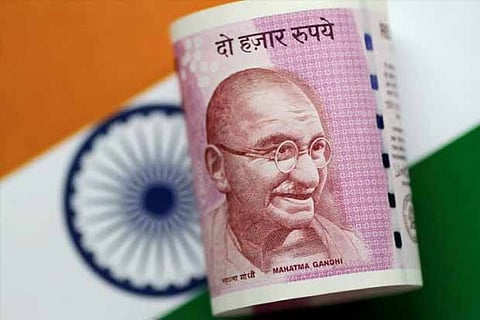

New Delhi
The government is determined to keep fiscal deficit at 3.3 per cent of GDP on the back of buoyant tax revenues and expectations of surpassing the disinvestment target, Finance Minister Arun Jaitley said Saturday but remained non-committal on cutting tax on petrol and diesel.
A day after steps to contain the widening current account deficit (CAD) and check fall of the rupee were announced, Prime Minister Narendra Modi on Saturday continued his two-day review of the economy as he took stock of tax collections and macro-economic indicators in analysing performance of different wings of the finance ministry.
After the meeting, Jaitley exuded confidence of surpassing the 7-7.5 per cent GDP growth target projected in the last Budget presented on February 1, meeting capital expenditure targets, surpassing tax collections projections and exceeding the record Rs 1 lakh crore target of revenue mobilisation from government stake sale in PSUs.
He, however, did not say if the meeting discussed the recent spike in fuel prices that has led petrol touching a record high of Rs 81.63 per litre and diesel to Rs 73.54 a litre.
There were expectations that the government may cut excise duty on the two fuels to ease burden on the consumers but it seems it didn't want to take chance as it stands to lose Rs 14,000 crore in revenue from a Re 1 per litre cut in excise.
It feels that the country cannot afford to have a twin deficit problem -- a depreciating rupee and high crude import bill putting pressure on the country's current account deficit (CAD), and a fiscal slippage.
"The government is confident and will strictly maintain the 3.3 per cent fiscal deficit target," Jaitley told reporters after the over three-hour long meeting.
With 44 per cent of the budgeted capital expenditure estimate for the current fiscal year ending March 31, 2019 already spent by August 31, the government "will end the year without any cut," he said, adding that it was extremely necessary to maintain 100 per cent capital expenditure for high growth rate.
"The government is confident that we will have a growth rate higher than what we had projected earlier this year in the Budget," he said. "The inflation is broadly under control".
On revenue collections, he said the impact of anti-black money measures, demonetisation and GST are now visible with "phenomenal" increase in tax base.
"The CBDT is very clear that this year they will be able to collect in excess of budgeted target," he said.
On indirect tax side, he said the Goods and Services Tax (GST) is settling down and a pick up in consumption will boost collections in coming months.
"We are confident that between direct and indirect tax collections, the government will comfortably meet the target if not surpass it," he said, adding the Rs 1 lakh crore disinvestment target will be surpassed.
"And on basis of all these analyses, we are optimistic about our growth rate, our tax collection and certainly as far as fiscal deficit is concerned will strictly meet the 3.3 per cent target," he said.
Asked if fuel prices and duty cuts were discussed, he said the meeting today was internal review meeting.
Almost half of the retail selling price of petrol and diesel is made up of central and state taxes. The Centre currently levies a total of Rs 19.48 per litre of excise duty on petrol and Rs 15.33 per litre on diesel. On top of this, states levy Value Added Tax (VAT).
"The primary focus of yesterday's discussions was with regard to current account deficit and how to narrow it down and possible steps with that regard. Today of course was an internal meeting in which the Prime Minister took the review of various departments of finance," Jaitley said.
After yesterday's review meeting, the government announced easing in overseas borrowing norms for manufacturing companies; removed restrictions on foreign portfolio investors (FPI) investment in corporate bonds and provided tax benefits on Masala bonds.
At Saturday's meeting detailed presentations were made by Departments of Economic Affairs, Revenue, Expenditure and Disinvestment.
"After those detailed presentations, Prime Minister expressed his satisfaction with regard to the broad parameters in relation to economy and macroeconomic data which is so far emerging this year.
"The department of revenue made a detailed presentation where the direct tax collections we are already ahead of the schedule...we can now see the impact of all the anti-black money measures which we had taken, the demonetisation and the GST. There is phenomenal increase in the assessee base...in the quantum of advance tax which has been paid," he said.
The government had in Budget projected direct tax collection of Rs 11.5 lakh crore for 2018-19 fiscal.
On GST, he said the new indirect tax regime is settling down and "with the kind of pick up in consumption which has taken place, obviously will have an impact on GST collections in the future months".
"As far as non-tax revenues are concerned the entire programme of divestment and strategic sale for this was also considered. Just the way we exceeded the target last year, we are confident of not only maintaining the disinvestment target this year but may perhaps be in excess," Jaitley said.
Visit news.dtnext.in to explore our interactive epaper!
Download the DT Next app for more exciting features!
Click here for iOS
Click here for Android